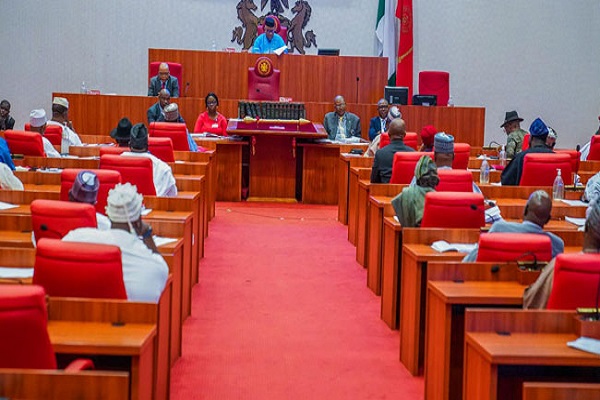News
Nigerian, 2 others win 2023 Waislitz Global Citizen Awards

Oluwafunke Adeoye, Nigerian human rights lawyer and two Kenyan citizens have won the 2023 Waislitz Global Citizen Awards.
The award is aimed at inspiring people working within their communities to overcome challenges like air and water pollution, period poverty, unstable infrastructure and gender disparities in education.
It is also to drive the mission to end extreme poverty and improve the living conditions of people globally.
Adeoye founded the Hope Behind Bars Africa, after some personal encounters with the justice system including that of her father’s arrest and detention for a crime he reportedly did not commit.
The organisation closes the justice gap by providing free legal services and direct support to low-income incarcerated individuals while promoting criminal justice reforms through research, evidence-based advocacy, and technology.
Over 7,000 incarcerated individuals have benefitted from their interventions.
With the award, Adeoye plans to fully launch Justicepadi, a tech platform that will revolutionise legal aid in West Africa and also expand her work for climate justice.
“It is crucial for people to understand that behind the labels of “convicts” or “prisoners”, there are human beings with stories, hopes, and dreams.
“By offering legal aid, we strive to ensure that every person, regardless of their circumstances, has access to fair representation and a chance to rebuild their lives”, Adeoye said.
The others are; Peter Njeri and Esther Kimani, both Kenya citizens, were named as the 2023 Waislitz Global Citizen Award winner and the Waislitz Global Citizen Disruptor Award winner.
The Waislitz Global Citizen Awards are annual cash prizes totaling $250,000 that recogniae the excellence of individuals in their work to end extreme poverty and its systemic causes.
The grand prize is $100,000, with two additional prizes of $75,000 each.
“When we first conceived these awards almost 10 years ago, we wanted to shine a light on those heroes working at grassroots levels to end global poverty. We also wanted to encourage others to do the same.
“The awards have grown in stature and participation rates every year and I am proud that we’ve been able to assist so many outstanding and inspirational young champions from around the world to advance their efforts in the fight against global poverty.
“This year’s winners are no exception and I wholeheartedly congratulate them all”, Alex Waislitz, Chairman and Founder of the Waislitz Foundation said.
Peter Njeri, who grew up in Soweto, Nairobi, and saw his family suffer first-hand from the effects of indoor air pollution, set out to solve this problem.
He produced a technology that turns plastic waste into clean energy and co-founded Mega Gas Alternative Energy— a clean-tech startup on a mission to provide access to clean and affordable cooking energy for low-income families all while protecting the environment.
Today, over 10,050 families in Kenya use his technology. The Waislitz Global Citizen Award will enable him to serve an extra 5,400 families each month.
Esther Kimani is the 27-year-old CEO of FarmerLine, a climate agritech trailblazer disrupting Africa’s agricultural sector.
With delayed detection of crop pests and disease destroying over 47 per cent crop yield every farming season, Kimani developed the first-ever solar-powered AI-based crop pests and diseases detection device.
Its vision is to end hunger and extreme poverty for a million marginalised smallholder farmers.
Her inspiration comes from experiencing farm losses from pests and diseases firsthand as she grew up farming on the slopes of the Aberdare mountains in Kenya.
Kimani’s technology has so far impacted over 60,000 farmers in Kenya.
Headline
Prince Harry visits sick Nigerian soldiers in Kaduna

Prince Harry and his team visited the 44 Nigerian Army Reference Hospital in Kaduna to interact with wounded soldiers who are receiving treatment.
The Duke of Sussex is in Nigeria with his wife to champion the Invictus Games, which Harry founded to aid the rehabilitation of wounded and sick servicemembers and veterans.
Nigeria joined the Invictus Community of Nations in 2022 becoming the first African country to join.
Prince Harry’s visit to Kaduna came 68 years after his late grandmother Queen Elizabeth II visited the state during the time of the late Premier of Northern Region Sir Ahmadu Bello.




News
Senate approves death penalty for drug traffickers

Senate on Thursday, May 9, approved the death penalty for those convicted on the charge of drug trafficking in the country.
The punishment prescribed in the extant NDLEA Act is a maximum sentence of life imprisonment.
The resolution of the Senate followed its consideration of a report of the Committees on Judiciary, Human Rights and Legal Matters and Drugs and Narcotics, National Drug Law Enforcement Agency (NDLEA) Act (Amendment) Bill, 2024.
The Chairman of the Committee on Judiciary, Human Rights & Legal Matters presented the report during plenary, Senator Mohammed Monguno (APC-Borno North).
The bill, which passed its third reading, aims to update the list of dangerous drugs, strengthen the operations of the NDLEA, review penalties, and empower the establishment of laboratories.
Section 11 of the current act prescribes that “any person who, without lawful authority; imports, manufactures, produces, processes, plants or grows the drugs popularly known as cocaine, LSD, heroin or any other similar drugs shall be guilty of an offence and liable on conviction to be sentenced to imprisonment for life” was amended to reflect a stiffer penalty of death.
Although the report did not recommend a death penalty for the offence, during consideration, Senator Ali Ndume moved that the life sentence should be upgraded to the death penalty.
During a clause-by-clause consideration of the Bill, Deputy Senate President Barau Jibrin, who presided over the session, put the amendment on the death penalty to a voice vote and ruled that the “ayes” had it.
But Senator Adams Oshiomhole objected to the ruling, saying that the “nays” had it.
He argued that matters of life and death should not be treated hurriedly, but Barau said it was too late, as he failed to call for division immediately after his ruling.
The bill was subsequently read for the third time and passed by the Senate.
-

 Headline5 days ago
Headline5 days agoSuspend cybersecurity levy– Reps to CBN
-

 Business5 days ago
Business5 days agoNigeria needs over $2bn to revive Ajaokuta Steel Plant, says Minister
-

 Headline3 days ago
Headline3 days agoPrince Harry visits sick Nigerian soldiers in Kaduna
-

 Entertainment3 days ago
Entertainment3 days agoAMVCA Cultural Day: BBNaija’s Neo, Venita win Best Dressed Male, Female
-

 Headline5 days ago
Headline5 days agoTinubu resumes work after foreign trip
-

 News5 days ago
News5 days agoShan George’s money returned to Zenith Bank account
-

 Metro3 days ago
Metro3 days agoEx-Sports Minister laments after hospital neglected him for hours over N80000 deposit



